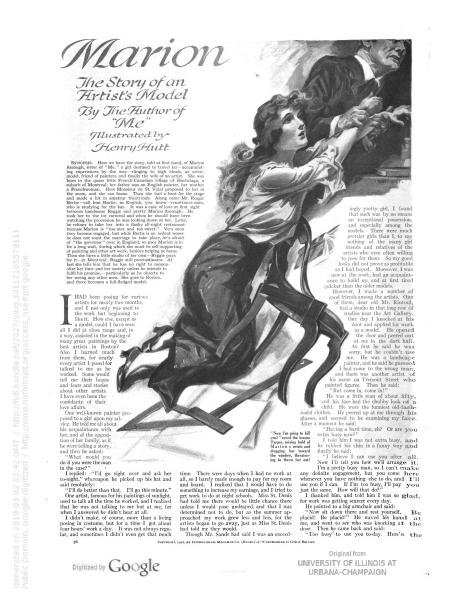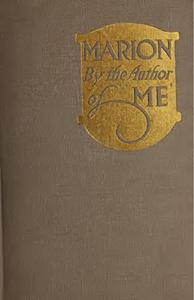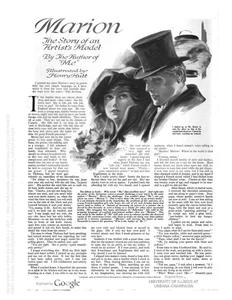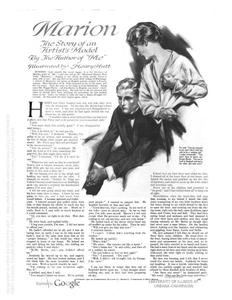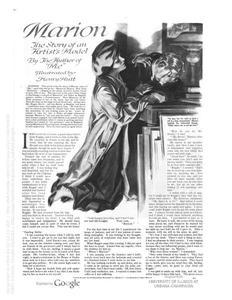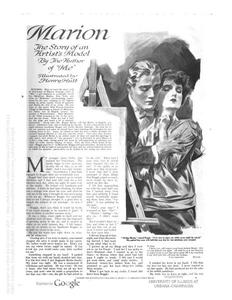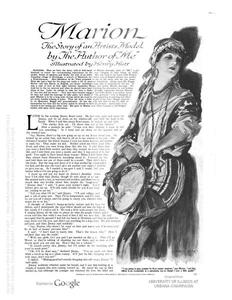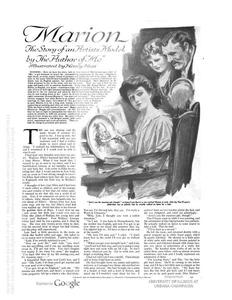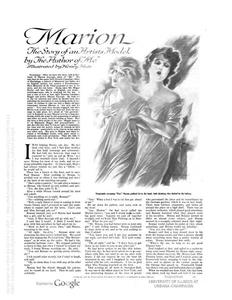Synopsis: Here we have the story, told at first-hand, of Marion Ascough, sister
of “Me,” a girl destined to eventually travel far—Montreal, Boston, New
York, and even to “Bohemia,” accumulating experiences by the way—clinging
to the highest ideals, as artist, model, friend of painters, and finally the
wife of an artist. She was born in the queer little French-Canadian village of
Hochelaga, a suburb of Montreal; her father was an English painter, her mother
a Frenchwoman. Here Monsieur de St. Vidal proposed to her in the snow, and she
ran home. Then she had a bent for the stage and made a hit in amateur
theatricals. Along came Mr. Reggie Bertie—call him Bartie, so English you
know—remittance-man, who is studying for the bar. It was a case of love at
first sight between handsome Reggie and pretty Marion Ascough. He took her to
the ice carnival and when he should have been watching the procession he was
looking down at her. Later, he refuses to take her into a flashy all-night
restaurant because Marion is “too nice and too sweet.” Very soon they
become engaged, but while Bertie is an ardent wooer he does not want the
marriage to take place; he’s afraid of “the governor” of England, so poor
Marion is in for a long wait, during which she must be self-supporting at
painting and other art work, besides helping at home. Then she hires a little
studio of her own—Reggie pays for it—in Montreal; Reggie still procrastinates.
At last she tells him that he has no right to monopolize her time and her
society unless he intends to fulfill his promise,—particularly as he objects to
her seeing any other men. She goes to Boston, and there becomes a full-fledged
model.
I had been posing for various artists for nearly two months, and I was not only
used to the work but beginning to like it. How else, except as a model, could I
have seen all I did at close range and, in a way, assisted in the making of many
great paintings by the best artists in Boston? Also I learned much from them, for
nearly every artist I posed for talked to me as he worked. Some would tell me
their hopes and fears and stories about other artists. I have even been the
confidante of their love affairs.
One well-known painter proposed to a girl upon my advice. He told me all about his
acquaintance with her, and of the opposition of her family, as if he were telling
a story, and then he asked:
“What would you do if you were the man in the case?”
I replied: “I’d go right over and ask her to-night,” whereupon he picked up
his hat and said resolutely:
“I’ll do better than that. I’ll go this minute.”
One artist, famous for his paintings of sunlight, used to talk all the time he
worked, and I realized that he was not talking to me but at me, for when I
answered he didn’t hear at all.
I didn’t make, of course, more than a living posing in costume, but for a time I
got about four hours’ work a day. It was not always regular, and sometimes I
didn’t even get that much time. There were days when I had no work at all, so I
barely made enough to pay for my room and board. I realized that I would have to
do something to increase my earnings, and I tried to get work to do at night
schools. Miss St. Denis had told me there would be little chance there unless I
would pose undraped, and that I was determined not to do so, but as the summer
approached my work grew less and less, for the artists began to go away, just as
Miss St. Denis had told me they would.
Though Mr. Sands had said I was an exceedingly pretty girl, I found that such was
by no means an exceptional possession, and especially among the models. There were
much prettier girls than I, to say nothing of the many girl friends and relatives
of the artists who were often willing to pose for them. So my good looks did not
prove as profitable as I had hoped. Moreover, I was new at the work, had an
acquaintance to build up, and at first tired quicker than the older models.
However, I made a number of good friends among the artists. One of them, dear old
Mr. Rintoul, had a studio in that long row of studios near the Art Gallery. One
day I knocked at his door and applied for work as a model. He opened the door and
peered out at me in the dark hall. At first he said he was sorry, but he couldn’t
use me. He was a landscape painter, and he said he guessed I had come to the wrong
man, and there was another artist of his name on Tremont Street who painted
figures. Then he said:
“But come in, come in!”
He was a little man of about fifty, and his face had the chubby look of a child.
He wore the funniest old-fashioned clothes. He peered at me through his glasses,
and seemed to be examining my face. After a moment he said:
“Having a hard time, eh? Or are you extra busy now?”
I told him I was not extra busy, and he rubbed his chin in a funny way and finally
he said:
“I believe I can use you after all. Now I’ll tell you how we’ll arrange it. I’m
a pretty busy man, so I can’t make any definite engagement, but you come here
whenever you have nothing else to do, and I’ll use you if I can. If I’m too
busy, I’ll pay you all the same. How will that do?”
I thanked him, and told him I was so glad, for work was getting scarcer every
day.
“Now sit down there and rest yourself. Be placid! Be placid!” He waved his
hand at me, and went to see who was knocking at the door. Then he came back and
said:
“Too busy to use you to-day. Here’s the 77money,” and he handed me
seventy cents, as if for two hours’ work.
“Oh, Mr. Rintoul,” I said, “I haven’t worked at all.”
“Now don’t argue,” he said. “That was our agreement, so be placid!”
One day when I went to pose he said that all the people in the studios were giving
a tea, and they had asked him to open the doors of his studio, so that the
visitors could see it. He remarked that he would take that day off. I
remarked:
“There must be an awful lot of artists here.”
He chuckled, and making his hand into a claw, whispered:
“Not all artists, but folks hanging on to the edge of art, and cackling,
cackling. Now run along, and keep placid!” and he handed me
a dollar for my “time.”
I never really posed for him at all, for he always had something else to do, but
he would make me sit in the big armchair and be “placid.”
He has now gone to the Land where all is placid, and whenever I hear that word, I
think of him, and my faith in good men is strengthened.
But not all of my experiences with the artists of Boston were as pleasant as that
with Mr. Rintoul and Mr. Sands and some others, I had one terrible experience from
which I barely escaped with my life.
I had posed several times for a Mr. Harper, who did a rushing business for
strictly commercial firms. He made advertisements such as are seen on street-cars,
packages of breakfast-food and things like that. I had posed for him in a number
of positions, to show off a certain brand of stockings, as a girl playing golf, to
advertise a sweater, and other things too numerous to mention here.
He was a large, powerfully built man, devoted to sports, and he used to tell me
about his place at Cape Cod, and how he fished and rode. He discovered that I
could paint, and he let me help him sometimes with his work. We got to be very
friendly, and I really enjoyed working for him and liked him very much. His wife
was a sweet-faced, gentle little woman, who occasionally came to the studio, and
she would sometimes put an extra piece of cake in his lunch-box for me. He said
she was a saint.
Of all the artists I worked for my best hopes rested on Mr. Harper, for my for he
had promised, if certain work he expected came, he might be able to employ me
permanently—not merely as a model, but assisting him.
11
One day after I had been working for him all morning, and we had lunch together, I
sat down on a couch to glance over a book of reproductions, when I felt him come
up beside me. He stood there, without saying anything for a while, and then,
stooping down, brushed my cheek with his hand. I was not quite sure whether he was
leaning over to look at the pictures, but I did not like his face so close, and
half teasingly I put up my hand and pushed his face away, as I might a fly that
was in my way. Suddenly I felt a stinging slap on my face. Surprised and angry, I
leaped to my feet.
“Mr. Harper, you are a little too rough!” I said. “That really hurt
me.”
I thought he was joking, but when I saw his face I realized that I was looking at
a madman.
“I intended to hurt you,” he said in the strangest voice, and then he cursed
me, and struck me again on the cheek. “Take that, and that and that!” his
voice rose with each blow. Then he took me by the shoulders and shook me till my
breath was gone.
“Now, I’m going to kill you!” he raved.
I fell down on my knees and screamed that I had not meant to offend him, but he
caught hold of my hands and dragged me along toward the window, shouting that he
was going to throw me out. We were seven stories up and he had dragged me
literally on to the window-sill. I tried to brace myself for death, as all my
resistance seemed as nothing to his awful strength; but even while we struggled at
the window the door of his studio opened and some one came in. Like a flash he
turned and, draggin me across the room, he literally threw me into the hall and
shut the door in my face. To this day I do not even know who had entered his
studio, but I believe it was a woman, and sometimes I wonder if it could have been
his wife.
In the hall I gathered myself up. My clothes were nearly torn off my back, and I
was black and blue all over. My hair was down and blood was running down my chin.
I climbed upstairs to another artist I had posed for, and when he opened the door
to my knock he was so startled by my appearance, that he called to his wife, a
sculptress, to come quickly.
“What is the matter? Whatever the matter?” she asked, drawing me in. “You
poor girl, what has happened to you?”
I could not speak at first. I tried to, but my breath was coming in gasps, and I
was sobbing. For the first time in my life hysterics seized me. They chafed my
hands and brought me something to drink, and then she held my hands firmly in
hers, and bade me tell her what had happened. Between sobs, I described the
treatment I had received. I saw husband and wife exchange glances, and I ended
with:
“And now I’m going to have him arrested.”
“Listen to me,” said Mrs. Wilson. “I know you have suffered terribly, and
that man ought to be killed; but take my advice, keep away from the police.
Remember, you have no witnesses. You could not prove the assault. It would be
your word against his, and you are only a model. Let it pass, and hereafter you
keep away from Mr. Harper.” her husband said:
“I’m surprised at Harper, the demanding brute. I’ve heard of queer doings down
there, and I know he has beaten messenger-boys, but, by Jove, I didn’t dream
he’d beat a girl. You must have aroused his temper in some way. You know he’s
unbalanced—of course you know that—every one does.”
No, I did not know that. He was worse than unbalanced, however. He was nothing
less than a madman.
I went home bruised and sore, and, as they advised, let the matter drop. As Mrs.
Wilson had said, I had no witnesses, and I was just a model!
It was the second week in May, but as warm as summer and the flowers were all
blooming in the parks. The artists were leaving Boston early that year. There
seemed only a handful of them left in town. I had scarcely any engagements. Mr.
Sands had left, and so had four other artists for whom I had been posing. Mr.
Rintoul, too, had gone away. I could no longer go to Mr. Harper, the man who had
beaten me.
I sat in my little hall-room, reading a letter from home.
’Dear Marion’ (wrote
Ada):
’We are all very glad to hear you are doing so well in Boston’ [I had told them so] ’and we hope you
will come home this summer.
’Papa is not at all well and mama awfully worried. There is not much
money coming in. I am doing all I can to help, and I gave up a good
position offered me by the C.P.R. to travel over their Western lines and
write travel pamphlets, because I will not leave mama just now.
’Charles would do more, but his wife won’t let him. I think you ought to
help. Ellen has been sending money regularly, but now Wallace is ill.
Even Nora sends us something each week.
’I must say, Marion, that you always were the one to think only of
yourself, and you always managed to have a good time. Now as you are
earning money in the States, and there are so many eager young ones at
home, you certainly ought to send home some money. It is wicked of you
not to.
’You will be sorry to hear that Daisy [the
sister next to Nellie] went into the convent to be a nun last
week. She simply was bent upon it, and nothing we could say or do would
stop her. You know she became a convert to the Catholic faith soon after
Nellie married De Rochefort. She is with the Order of the LIttle Sisters
of Jesus, and her name is now Sister Marie Anastasia. We all feel very
badly about it, and she is so young to shut herself up for life.
’Last Sunday I went for a walk as far as the Convent of Les Petites
Soeurs de Jésu, and I looked over the garden fence, but I could see no
sign of our Daisy. So I called: ‘Daisy! Daisy!’ and oh, Marion, I felt
awful to think of her behind those stone walls, just like a prisoner, and
I even imagined I saw her face looking out of one of the windows of the
solemn, ghostly-looking convent building. It is a
117very hard
Order. We did everything to dissuade her, but one night she took the
pilgrimage to St. Anne de Beaupré on a sort of prayer ship, and she never
got off her knees all night long. Do you remember what beautiful hair
Daisy had—the only one in our family with golden hair—well, it was all
shaved off, mama says, though that was unnecessary till her final vows.
So we’ve lost Daisy. It’s just as if she were dead.
’I met that Lil Markey on the street and she asked for your address. She
said she was going to New York. She’s pretty common, and if I were you
I’d not associate with her. You should have some pride.
’Write soon, and send some money when you do. Sooner the better. Love
from all.
’Your aff. sister,
ADA.’
I looked at my money. I counted all that I possessed. I had just six dollars and
twenty cents. I was badly in need of clothes, and I was only eating one meal a
day. For breakfast and lunch I had simply crackers. Still, I felt that those at
home probably needed money more than I did. So I wrote to Ada:
’Dear Ada:
I was so sorry to hear papa is ill, and that you were all having a hard
time; so I enclose $4, all I can spare just now. I am not making as much
as I thought I was going to when last I wrote you; but I’ll soon be doing
fine, so don’t worry about me, and tell papa and mama everything is all
right.
’It’s awful about Daisy. She’s a poor little fool, and yet perhaps she is
happier than any of us. Anyway, I guess she feels peaceful. It must be
sweet not to have to worry at all. Still, I don’t believe in any stupid
churches now.
’You don’t understand about Reggie. He was and is in love with me, so
there, and he writes to me every day begging me to return. I guess I know
my own affairs better than you do. I have no more news, so will say
good-by, and with love to all.
’Your aff. sister,
MARION.’
I posted my letter and then started out to keep an engagement to pose for an
illustrator on Huntington Avenue. He had a charming studio apartment in a new
building. I knew both Mr. Snow and his wife pretty well, for I had posed for most
of his recent work. They had only been married a little while. She was very
pretty, and sweet, too. He was a tall, rather lanky man of about thirty, and his
long teeth stuck out from under his mustache. He made a great deal fo money, and
he said he had the knack of making pretty girls’ faces, and that was what the
magazines wanted.
He was in a very genial mood that afternoon, and chatted away while he drew my
head. He was making a cover for a popular magazine. I had removed my waist, and
arranged some drapery about my shoulders to give th effect of an evening gown.
When he was through, and I was buttoning up my waist in the back, he came behind
me and said:
“Allow me,” and started to button my waist for me, but while he was doing it
he kissed me on the back of my neck.
“I think—” I began, when a sweet voice called from the doorway: “I have
brought Miss Ascough and you some tea, dear.”
Mrs. Snow had entered the room, carrying a tray in her hand. She was a frail,
pretty little thing, with beautiful reddish hair piled on top of her head. Mr.
Snow went forward and took the tray from her hands, and bending down he kissed the
hands holding it.
“Thank you, darling,” he murmured, “What an angel you are!”
It was getting dark as I walked down Huntington Avenue, and somebody was walking
rapidly behind me, as if to catch up with me. “Hallo, Marion!”
I turned to see Jimmy Odell. He had been hanging around my lodging-house for days,
and was always coaxing me to go to places with him and declaring that he was in
love with me.
I liked Jimmy, though the people where I took my meals told me he was no good.
They say his people had given him every advantage, but that Jimmy had played all
his life and that his mother had spoiled him. However, I found him a most lovable
boy, despite his slangy speech and pretended toughness of character. Jimmy liked
to pretend that he was a pretty bold, bad man of the world. He was in his junior
year at Harvard and about my own age.
Many a time, when it seemed as if I could not stand my life, I was cheered by
Jimmy, with his happy, contagious laughter, and the little “treats” he would
give me. Sometimes it was a ball game, sometimes a show, and I had eaten many
dinner and suppers with Jimmy. But Jimmy drank far too much. He didn’t get exactly
drunk, but he carried a flask of whisky with him, and he would say to whoever was
about:
“Have a drink,” and if no one accepted, he would say: “Well, here’s to you,
anyway,” and drink himself.
It was no use my lecturing him about it, for he would just laugh at me and say:
“All right, grandma, I’ll be good,” and then go right ahead and do it
again.
Once, when he told me for the hundredth time that he loved me and begged:
“Come along. Let’s get married and fool ‘em all.” I said:
“If you do without whisky for two weeks, and then come and tell me on your honor
that you have not touched it, maybe I will.”
He said: “That’s a go. I take you up!” and we shook hands solemnly on it; but
the very next time he came to see me I smelled the whisky on him, and he said he
hadn’t started the “two weeks’ water-wagon stunt” yet.
I was glad to see Jimmy’s happy face that evening, and tucking my hand in my arm
we walked along the avenue.
“Gee!” said Jimmy, as we passed the hotels all lit up and looking so inviting
and fine, “I wish I had the cash to blow you to supper, Marion, but I seem to
spend every cent before I get it.”
“Never mind, Jimmy,” I said. “I’ve my meal-ticket for that
boarding-house.”
“Oh, that hash-flinging joint!” groaned Jimmy. “Say, Marion, I know a dandy
place on Boylston Street, corner of Tremont, where there is mighty good grub
and beer, and they don’t soak a fellow fancy prices. Let’s go there now, what
do you say?”
“All right, but I thought you said you were broke?”
“Oh, that’s all right,” he replied airily. “Come along, and don’t ask
questions.”
Somehow, when I was with Jimmy, I never felt serious and I seemed to catch his
happy-go-lucky spirit, and say to myself: “Oh, well, I don’t care!”
Gaily we started for Jimmy’s restaurant. We had reached Elliott Street, when Jimmy
said:
“Hold on a minute. You wait in this doorway for me a moment, Marion. I have to
see a man on a matter of business.”
I stepped into the doorway, but I watched Jimmy. He swung into a shop over which
there were hung three golden balls. Oh! I knew that place, for I had already
visited it. It sheltered my engagement ring—the ring Reggie had given to me! In a
few minutes out came Jimmy, minus his spring overcoat. It is true the day had been
warm, but the nights were still chilly, and I felt badly to see him without his
coat.
My feelings were mingled. If I did not go with him, I knew he would spend it all
on drink. Besides, he had pawned his coat for me, and I felt it would be
ungrateful to refuse to go with him now.
Jimmy ordered us a splendid supper, oysters, a big steak, beer; but it would have
tasted better if I had not known about that overcoat, and I almost cried when we
got out to the street, and he had to turn up the collar of his coat.
The following night Jimmy came round, sure enough, not only with his overcoat,
but, as he said, “the price of another bang-out.”
He said his mother had wept when she saw him “shivering,” and “you better
believe no one ever shivered better than I did,” said Jimmy.
So I went to supper again with Jimmy. When we were sitting at the table, and he
started to order beer for me, I said: “Now look here, Jimmy, I’ll eat supper
with you, but I won’t drink with you, and that’s all there is to it.”
“Be a sport, Marion.”
“I don’t pretend to be a sport,” I replied,
118“and anyway in
Montreal that means to shoot or skate or snowshoe or toboggan. Here when you
say ‘sport’ you mean to drink a lot of liquor. I think it’s horrid.”
Jimmy regarded me reproachfully.
“I bet those farmers in Montreal drink their share all right,” he said. “Of
course, that bum Canadian village isn’t really on the map at all” (he was
teasing me), “but I’ll bet the booze is right there. Say, do you really have
cars running there? I bet you had some jay-barmer beaux all right-o! How about
the ones whose letters you’re always so glad to get? You nearly fell down the
stairs the other day in your hurry to get that one from Miss Darling.”
I couldn’t help laughing to think of Reggie being called a farmer. Jimmy took
offense at my laughter.
“Say, what’re you laughing about anyhow? If you don’t want my company, say so,
and I’ll take myself off.”
“Don’t be silly, Jimmy. You know very well I like your company, or I wouldn’t be
sitting with you now.”
“Then why can’t you drink a glass of beer with a fellow? I bet you would if I
were that Montreal chap.”
“I’ll drink the beer on one condition,” I said, “if you’ll promise not to
drink any whisky to-night.”
Jimmy leaned over the table.
“I’ll promise you anything on earth, Marion. I’m half crazy about you
anyhow.”
The waiter was passing and, looking at us, he said:
“No kissing allowed.”
Jimmy was on his feet.
“What the devil do you mean? Did you mean to insult this lady?”
His voice was raised and he seized that waiter by the collar. I felt ashamed and
afraid. I jumped up and tried to pull Jimmy from the waiter, but he wouldn’t let
go.
“Please, Jimmy, for my sake, stop!” I pleaded.
The waiter was smiling a forced sort of smile, and he said:
“No insult was intended, sir.”
“All right then, apologize to this lady.”
The waiter did so. “And now,” said Jimmy, in a very lordly way, “come
along, Marion, we don’t have to stay in this place. Come along.”
When we got out to the street, I turned upon him and said:
“You can take me home, Jimmy Odell. I won’t go into another restaurant with you.
I’m not going to be disgraced again.”
“Oh, all right-o!” said he sulkily. “I guess I can get all the whisky I
want alone, without anyone preaching to me,” and he turned around, as if to
leave me. I ran after him and caught him by the arm.
“Jimmy, don’t drink any more.”
He tried to shake off my hand, and he said recklessly:
“What difference does it make? You don’t care anything about me. You wouldn’t
really care if I drank myself to death.”
“I would care, Jimmy. I care an awful lot about you.”
Jimmy stopped short in the street.
“Do you mean that? You do care for me?” I nodded. “Very well, then,”
said he, “it’s up to you to stop me. If you’ll marry me, I’ll quit the booze.
That’s on the level, Marion.”
“Now, Jimmy, you know what I told you before, and yet you couldn’t keep away
from that old flask of whisky. You love it better than me. And I’m not going to
marry you till I do see some real signs in you of reforming.
Besides, anyway, you’ve got two years yet to finish at Harvard, and I guess
your people would be crazy if you got married before you graduated.”
“Say, who is marrying, they or me?” demanded Jimmy. “Ah, come along, like a
good fellow. Here’s just the joint we want,” and he drew me into a
chop-house on Washington Street.
No sooner was he seated at the table than he ordered two steins of beer for us,
but he kept his word about the whisky. I had difficulty in drinking from the
stein, as the lid knocked my hat crooked, and this amused Jimmy vastly. He began
to chuckle loudly all of a sudden, and he leaned over the table and said:
“Tell you what I’ll do, Marion. My sister’s giving some sort of party to-morrow
night. How’d you like to go along?”
“Why, how can I? She hasn’t invited me.”
“Well, I guess I can bring my friends to our house if I want,” declared
Jimmy, as though someone had questioned his right. “Will you, or won’t you go?
Yes or no?”
“W-e-l-l—”
“No well about it. Yes or no?”
“Yes.”
I didn’t have any work at all to do the next day, so I stayed in and fixed up a
pretty dress to wear to the party at Jimmy’s house. He called early for me,
bringing along another student named Evans, who played the guitar. We stopped for
Benevenuto, an Italian, who played the mandolin with Evans, and whom I had met
several times.
At the last moment I hesitated about going and I said:
“Maybe your mother and sister won’t want me. If they knew I was a model, I’m
sure they wouldn’t.”
“Great Scott!” burst from Jimmy, “that just proves how beautiful you are,
Marion. If I were a girl, I’d be proud to say that the artists wanted me for
all those fine paintings. I’ve not seen a magazine cover to compare with your
face, Marion, and, say—my folks ought to be proud to know you, eh,
Evans?”
Evans grinned, and Benevenuto nodded violently. It was nice to have Jimmy think so
well of my “profession,” and I didn’t tell him that all models were not
necessarily beautiful. Some of them are very ugly, but “paintable.”
As we were going along in the car, Jimmy said to Evans:
“Say, Bill, you want to get next to my sister’s friend, Miss Underwood. She’s a
fine girl, and has heaps of dough. My sisters want her for a sister-in-law, but
little Jimmy has his own ideas.” Turning to me, he added with a tender
smile: “She can’t begin to hold a candle to you, Marion.”
Jimmy’s people lived in a very fine house, and I felt much impressed and somewhat
anxious as we passed in. His sister looked like Jimmy, and had his features, but
where the tall, swinging figure and handsome face made a fine-looking man, the
same type in a woman did not make beauty. She looked hard and bony. Her manner to
me was of the most frigid, and I saw her give Jimmy an angry glance as he airily
presented me. She kept him on one excuse or another right by her side and that of
a very tall girl all evening. Benevenuto and Evans were soon playing for the
company, and I, who had not been introduced to many of the people, found a quiet
corner of the room, where I could sit unobserved and watched everyone.
I had been there some time, and Benny and Evans had given way to a girl who was
singing in a high voice “The Rosary,” when suddenly I heard Benevenuto’s
voice speaking softly in my ear:
“Miss Marion, will you permit me to call upon you?”
He was small and dark, and his hands were soft and brown. He had shining black
eyes and hair that curled. He could play beautifully, the reason why the students
at the boarding-house chummed with him.
I had never given Benny much thought or attention, except when he played in the
room below me, where Evans roomed. I would open my door and listen to the strains
of music, and sometimes Evans would call up to me to come down. One day I had been
listening to them play, and when they got through joked with Benny about
something. He came over and sat down beside me on the couch, and he said: “I
like-a you, Miss Marion. You look like-a my countrywomen.”
Miss Darling had said to me that night:
“Be careful how you flirt with an Italian. They are pretty dangerous fire to
play with.”
So when, that night of the party, Benevenuto asked me if he might call, I thought
of that and I said: “Oh, I’ll see you when you are playing in Mr. Evans’s room
some night.”
“No,” he persisted, “I like-a make special call on you. Please to
permit!”
To humor him, I said:
“Oh, all right, and bring your mandolin.”
He smiled at me ecstatically and said fervently:
“Me—I am coming right away, to-morrow night.”
It was time to go. Most of the guests were going into the bedroom for their wraps.
Nobody noticed me. So I slipped into the room where Jimmy had taken me upon my
arrival there. It was his mother’s he had said, but she was away at their country
place. I noticed on the bed a black-straw hat with a steel buckle holding the
severe bit of plumage, and I thought to myself that it was probably his mother’s
hat, for no one else had put their wraps in this room. I was putting on my own hat
at the mirror when I heard someone say:
“Shh! Shh!”
I turned around, and there was Jimmy in the doorway. He was whispering with his
hand to his mouth.
“Marion, say good-night to my sister quickly and then sneak away. I’ll be
waiting on the porch.”
So I found my way back to where his sister and a number of guests were, and I
wished them good-night and thanked Miss Odell for the lovely time I had not
had.
“Good-night,” she returned coldly, “your friend Mr. Benevenuto will see you
home.” Then she turned to the girl at her side: “Jimmy will be delighted
to take you home, dear. He is still in the upper room.”
I felt like saying: “He is waiting for me!”
As we walked home, Jimmy said:
“I couldn’t get away from sis. Gad! that friend of hers may be handsome, but I
hate handsome horses. I like a little pony like you, Marion.”
“Don’t you think I’m handsome then?” I asked mischievously.
“Not in a long shot. You are the most kissable—little—”
“Jimmy, behave yourself. Look at that policeman watching us, and don’t forget
that waiter.”
“Oh, hang policemen and waiter,” growled Jimmy. “What the devil do
they know about kisses?”
“When you want to kiss me, Jimmy Odell,” I said, “you’ll have to come
without that whisky odor on your breath.”
“Oh, all right-o!” said Jimmy, “I guess there are others won’t mind
it.”
“No, I guess not,” I sniffed. “Horses haven’t much smelling sense.”
There was a rap on my door. I opened it, and there was Benevenuto. He had on a
black suit. It looked like the suits the poor French Canadians dress their dead
in. He had plastered his hair so sleekly that it shone like a piece of black
satin, and oh! he did smell of barber’s soap and perfume. His big black eyes were
shining and he was smiling all over his face.
“Where is your mandolin?” I asked.
“I have called to see you,” he answered. “Me, I am not
musician to-night.” When he saw my evident disappointment, he said: “But
if I am not welcome for myself, I can go.”
I felt really sorry for him, as his smiling face had become so suddenly mournful
and sorry looking. So I said:
“Oh, I’m really glad to see you,” and I tried to smile as if I were. He came
to me with a kind of rush and said excitedly:
“Marion, I love-a you! I love-a you! I love-a you! Give me the smile again. That
smile is like-a music to me. I love-a you!”
I was amazed and also alarmed.
“Mr. Benevenuto,” I said, backing away from him, “please go away.”
I thought of what Miss Darling had said, that Italian men were not to be played
with. I had merely smiled at Benny, with what a volcanic result! He was coming
nearer and nearer to me, and he kept talking all the time, in his soft, pleading
way:
“Marion, I have-a love-a you from the first day I have-a look at you. You look-a
like my countrywomen, Marion. We will getta married. Soon I will make plenty
money. We will have maybe little house and little bebby.”
I could stand it no longer. He was only a boy after all, and somehow he made me
think of the little beggar-boy I had pinched when I gave him the bread and sugar.
I pushed him away from me, and I said:
“Don’t talk such foolishness. I am old enough to be your mother.” I think I
was about three years older than he.
“No matter, Marion,” he said, “no matter. I do not care if you are so old.
I love-a you just the same.”
I was sidling round along the wall, and now I had reached the door. I ran down the
stairs, and I did not stop till I reached the safety of Miss Darling’s room.
“What on earth is the matter?” she cried, as I burst in.
Between laughter and tears I repeated the interview. She couldn’t help laughing
with me, especially when I told about the part of “the little bebby.” then
she said:
“Well we’ll get him out now, but you must never flirt with an Italian. You’re
apt to be killed if you do.”
(“Marion’s” further experiences as a model
will interest and amuse you in the September Hearst’s.)
